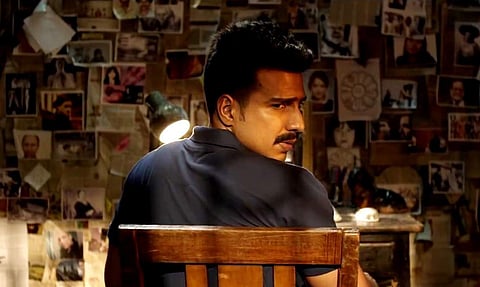

Director: Ramkumar
Cast: Vishnu Vishal, Amala Paul, Kaali Venkat and Ramdoss
Rating: 3/5
If I had to pick two things about Ratsasan that were extremely fascinating, it had to be the way it has been edited and the sound design of the film. Ratsasan’s nifty cuts and sound cements the ‘effect first, cause later’ strategy that the cameras and screenplay adopt. One might say that this is normal modus operandi for a thriller. Well, it isn’t just about the turns that the story takes but also about how they are revealed. In one particular sequence, a suspect holds a police officer at gunpoint in an attempt to escape. As he backs into a lift, we hear a shot and the lift opens to reveal both men on the ground. The suspense lingers a second longer before we get our answer. And Ramkumar’s answers are effectively simple for the part. Take a chase sequence where Kaali Venkat, a cop, is in close pursuit of the killer; the former is on a bike while the latter is in a van. How does one lose the trailing cop? Ramkumar comes up with another ingenious solution - stop the van abruptly.
Ratsasan’s ‘deferred returns’ approach not only applies to people watching the film but also for the people in it. The research Arun (Vishnu Vishal) does for his chosen profession turns out to help in the profession he enters due to circumstances. I liked the fact that most of the scenes in Ratsasan have a reason for its existence. There are surprises decked organically in the narration and Ramkumar even packages his lighter moments with details that have recall value. But the reasons aren’t always plausible; some feel forced and some feel convenient. For example, Arun happens to use the same auto he is searching for; in another moment, another cop accidentally crosses path with whom he is pursuing. It isn’t a giant error of logic, it could happen. But it feels convenient. However, Ratsasan almost immediately redeems itself with some great visual moments. This is both a win and fail for the film as these moments keep you your eyes glued to the screen more than the mind. I could appreciate the aesthetics but it didn’t get me pumped enough to scream for the villain’s death. The final act especially has several such moments that leave us emotionally distanced, despite some neat performances from Munishkanth, Kaali Venkat and Vishnu Vishal himself.
As I was watching, I was reminded of another psycho-killer film, Imaikka Nodigal. Both films are made for the mainstream but Ratsasan doesn’t indulge as much as Imaikka... does in its commercial trappings. Rather Ram Kumar places his characters as cornerstones for his screenplay. The supporting characters even the smaller ones, show some agency. Ratsasan isn’t only about Arun swooping in to save the day; it is also about the girl who manages to escape from a tough situation. Even Viji (Amala Paul) gets a few memorable cinematic moments, even though her character needed more attention to go beyond the template heroine. But do good stretches automatically add up to a great film?
I wish Ratsasan had adopted a more explorative approach towards the cyclical nature of abuse. There is a demon who is more disturbingly closer to life than the actual antagonist. Had Ratsasan taken the meta-route, he would have become our villain, leaving us with a question. Do we really recognise the demons amid us? But with its straightforward approach, we have a thriller where the sum feels lesser than its parts.